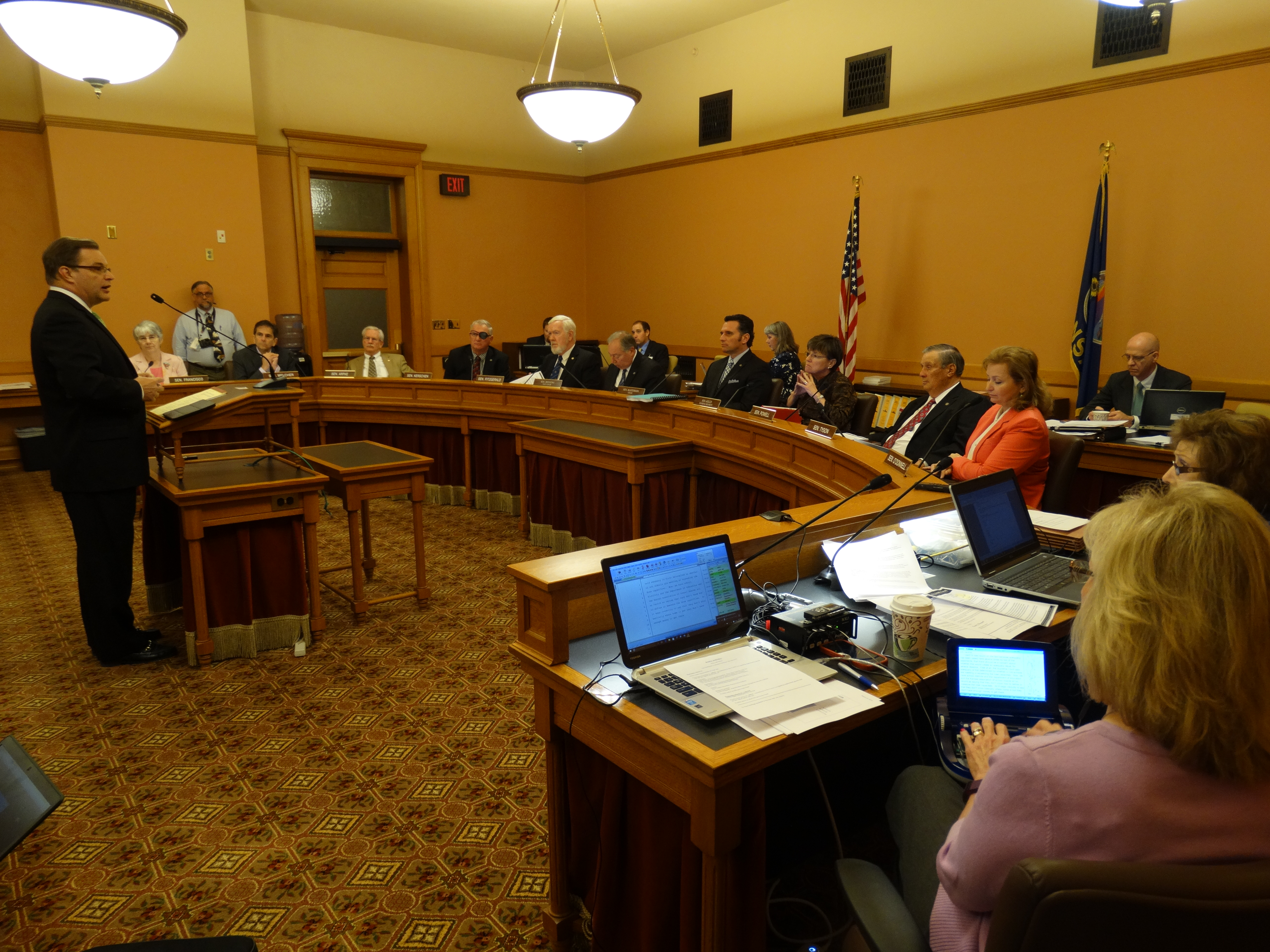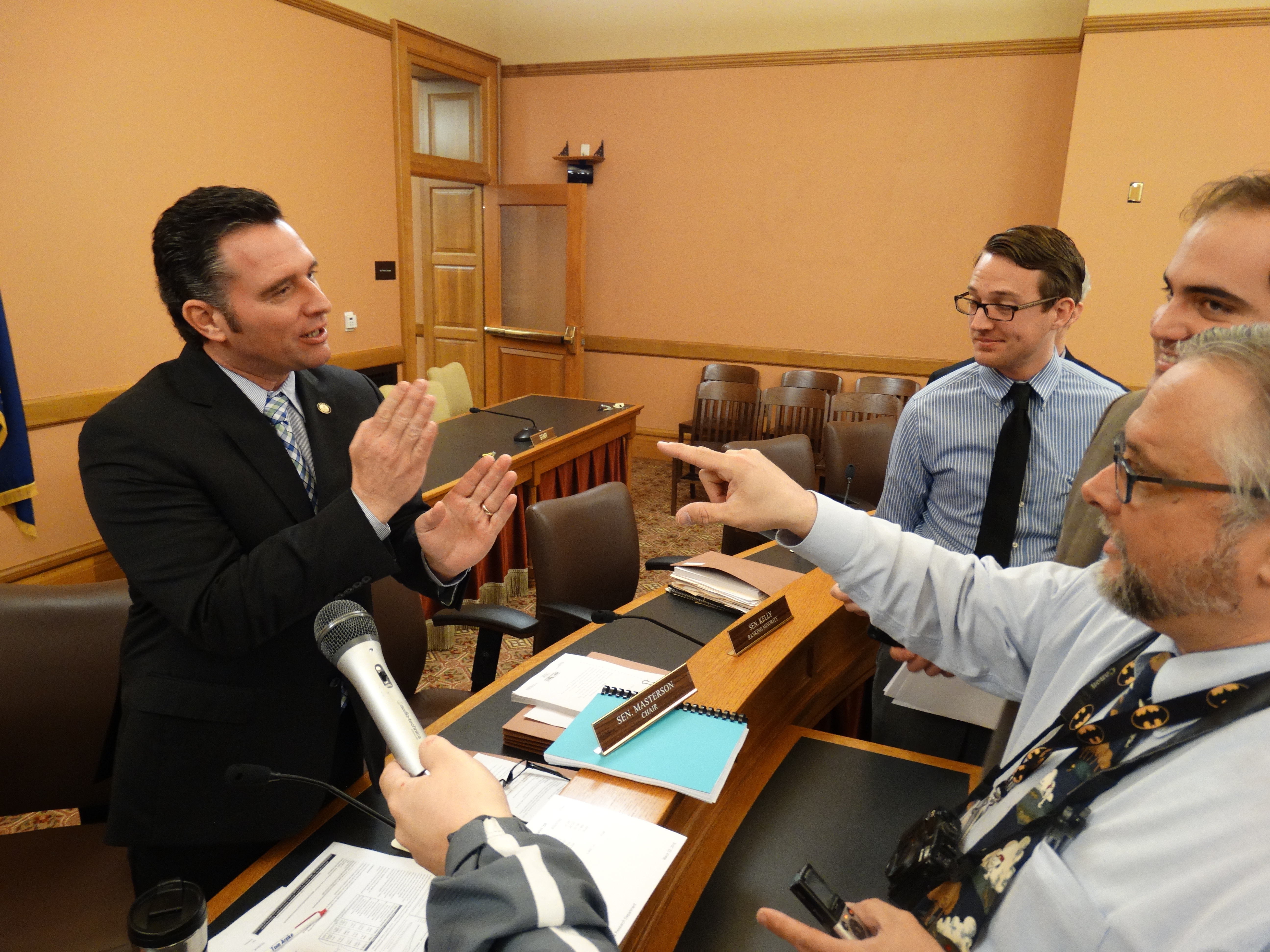Kansas lawmakers hope to send school funding bill to Brownback by Thursday

A court reporter takes down testimony while Kansas Policy Institute president Dave Trabert speaks to the Senate Ways and Means Committee about a school funding equity bill. Lawmakers hope to pass a bill this week, and they are preparing to defend it before the Kansas Supreme Court.
Topeka ? Republican leaders in the Kansas Legislature say they hope to send a final version of the latest school funding equity bill to Gov. Sam Brownback before they adjourn Thursday for their four-week spring break.
Both the House and Senate budget committees advanced their respective versions of the bill Wednesday. The full chambers are expected to debate and vote on the bills Thursday, the scheduled last day of the 2016 regular session. It is also possible either chamber could simply concur with the other chamber’s bill and send it directly to the governor.
“The main benefit (to quick passage) is time,” Senate Ways and Means Committee Chairman Ty Masterson of Andover said. “If they wish to opine on it prior to our return (in late April), then we have one more opportunity to respond, if that’s possible. The whole point of this speed is surety.”

Senate Ways and Means Committee Chairman Ty Masterson, R-Andover, answers questions about a school funding equity bill after a committee hearing Wednesday.

A court reporter takes down testimony while Kansas Policy Institute president Dave Trabert speaks to the Senate Ways and Means Committee about a school funding equity bill. Lawmakers hope to pass a bill this week, and they are preparing to defend it before the Kansas Supreme Court.
Both bills are a response to a Kansas Supreme Court ruling in February that said the current method of distributing so-called “equalization” aid to school districts is unconstitutional because it requires less wealthy districts to levy higher property tax rates in order to raise comparable amounts of money.
The court said if lawmakers do not cure the disparities before July 1, the first day of the next fiscal year, it could order the closure of public schools until the Legislature produces a constitutional funding mechanism.
The Senate committee inserted language into its bill, meant as a message to the Supreme Court, spelling out its rationale for the changes it makes, and various “findings of fact” the committee made after conducting three days of deposition-like hearings from state education officials, local school districts and other groups that lobby on education issues.
Among those are statements that say the previous equalization formulas, “had no basis in educational policy,” and that, “this act fully complies with the supreme court’s order.”
Sen. Laura Kelly, of Topeka, the ranking Democrat on Senate Ways and Means, said she did not think the court would be swayed by those statements.
“I certainly appreciate all the editorializing we put into the bill today. I’ve never seen that happen before. But we don’t usually have transcriptionists sitting in our hearings either,” she said. “I do believe that this is cobbled together in the hopes that the court, which probably doesn’t want to shut the schools own either, will say this is good enough.”
According to an analysis by the Legislature’s nonpartisan Research Department, the bill being considered in the Senate would narrow that disparity. But whether it narrows the disparity enough to satisfy the Supreme Court remains to be seen.
The analysis showed how much property tax, on average, would have to be levied for each school district to have a local option budget equal to 25 percent of its state-prescribed general fund budget.
Local option budgets are the additional amount of general expense funds districts are allowed to raise, above what the state provides, up to a maximum of 33 percent of their general fund budgets.
The state subsidizes those mill levies for poorer districts so they do not have to levy higher property tax rates than wealthier districts.
According to the analysis, under the bill, the wealthiest 20 percent of districts would have to levy, on average, 15.51 mills to generate a 25 percent local option budget. The poorest 20 percent of districts would have to levy an average of 18.658 mills — a difference of 3.148 mills, or $54.30 per year in tax on a home valued at $150,000.
That’s narrower than the 5.456 mill disparity under current law, and significantly narrower than the 15.855 mill gap that existed during the 2013-2014 school year.
But officials from the Kansas City, Kan., and Wichita school districts testified against it, arguing that it only redistributes money already appropriated and does not provide any new funding for them to operate.
Jim Freeman, chief financial officer of the Wichita district, said that district is already contemplating laying off staff this year if lawmakers do not increase overall funding for schools.
Throughout the hearings in both the House and Senate committees, a court reporter was present to transcribe testimony. Lawmakers say they are trying to build a record that can be submitted to the Supreme Court to document why they believe the legislation they adopt answers the court’s concerns.
Lawmakers also added $50,000 to their own budget this year to hire an outside attorney to advise and represent them in the court proceedings.






